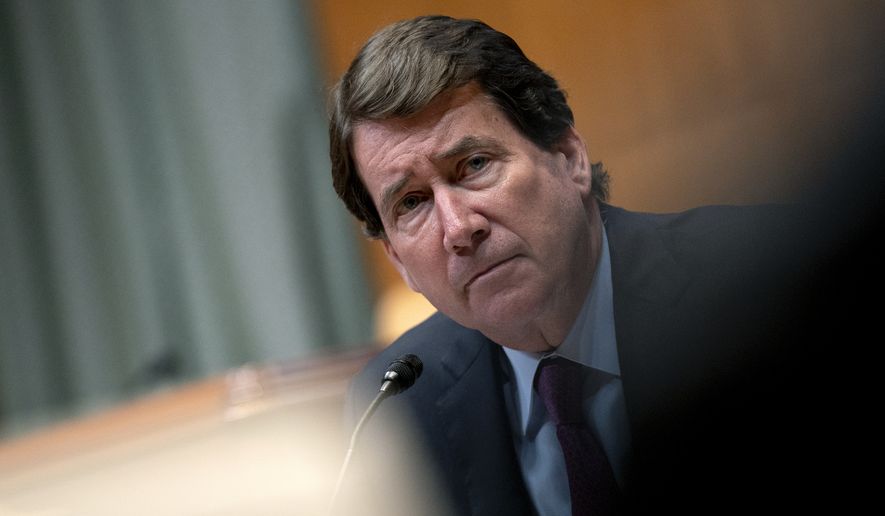Senate Democrats blocked an attempt on Sunday to consider a series of bipartisan changes to President Biden’s $1.2 trillion infrastructure package.
Sen. Bill Hagerty, a first-term Republican from Tennessee, attempted to bring more than 20 amendments to the floor of the Senate for consideration. The proposals were authored by lawmakers from both parties in what they said was an effort to improve the deal and ensure it is properly funded.
“There are a lot of amendments that people want to get passed,” Mr. Hagerty told The Washington Times. “A lot of them are good amendments that would make the legislation better, were they to pass.”
One such amendment, by GOP Sen. Joni Ernst of Iowa, would have forced the federal government to disclose the cost of the infrastructure package and its projects to taxpayers. Another amendment, from Democratic Sen. Chris Van Hollen of Maryland, would have allowed the federal government to hire 140 more “scientific and engineering personnel” to oversee projects.
Mr. Hagerty’s motion, however, was blocked by Sen. Krysten Sinema, a moderate Democrat from Arizona.
Under Senate rules, unanimous consent is required to initiate action on the floor, meaning essentially that all 100 senators must agree to move forward. Mr. Hagerty has used that prerogative to prevent Senate Majority Leader Charles E. Schumer from pushing through the deal with limited amendments.
Ms. Sinema, who helped author the infrastructure package, argued that it was unfair to consider the amendments since Mr. Hagerty had refused to allow Democrats to expedite the overall deal.
“As the senator from Tennessee made clear yesterday in his remarks on the floor, he has declined to provide unanimous consent for a time agreement moving forward,” said Ms. Sinema. “I’m sure it is no surprise that there are senators on both sides of the aisle who object to … one or more of the amendments [he has proposed] … I’m sure that he offers the same level of respect to those senators denying their unanimous consent as has been offered to him as well.”
Mr. Hagerty said the objection exposed the “true intention” of Democrats. Rather than having a “good infrastructure” and putting in the time to fix the current bill’s deficiencies, he said, Democrats were only interested in “checking a box” on the issue and moving forward.
“I never objected to considering amendments on this bill, not once,” he said. “Democrats say that they want amendments, but they can’t take ’yes’ for an answer … The only way that Democrats will agree to amendments is if they can rush this bill through.”
The Congressional Budget Office determined late last week that more than half of the $550 billion in new spending in the package is unfunded.
Despite the news, Mr. Schumer is pushing to pass the infrastructure bill as soon as possible. As such, the majority leader has proposed to consider two-dozen amendments — out of more than 150 filed — before a final vote is held.
For the maneuver to succeed, however, all 100 members of the Senate have to acquiesce. At the moment, Mr. Hagerty is the lone holdout.
Most Republicans have quietly backed the effort to wrap consideration of the bill, conceding that it has sufficient support to become law. That was evidenced on Saturday when 18 Republicans voted with all 50 Democrats to break a filibuster and advance the legislation.
Mr. Schumer’s frantic pace comes as lawmakers prepare to depart Washington for a month-long break. Before they can leave town, though, the majority leader has pledged to pass both the infrastructure bill and a $3.5 trillion social welfare bill.
“As I’ve repeated, discussions about infrastructure are moving forward along two tracks,” Mr. Schumer said. “And the two tracks are parallel, working in concert, and progressing well.”
The $3.5 trillion legislation, which Democrats have dubbed “human infrastructure,” contains a slew of liberal priorities, including new climate-change regulations and amnesty for illegal immigrants.
Because those provisions are unlikely to garner GOP support, Democrats plan to pass it along party lines via budget reconciliation. The process allows spending measures to avoid the Senate’s 60-vote hurdle and pass with a simple majority of 51 votes.
“Democrats’ true intention is to rush this [infrastructure] bill through so that they can hurry up and light the fuse on their $3.5 trillion spending spree, a socialist debt bomb, then leave town for vacation,” said Mr. Hagerty.
• Haris Alic can be reached at halic@washingtontimes.com.




Please read our comment policy before commenting.